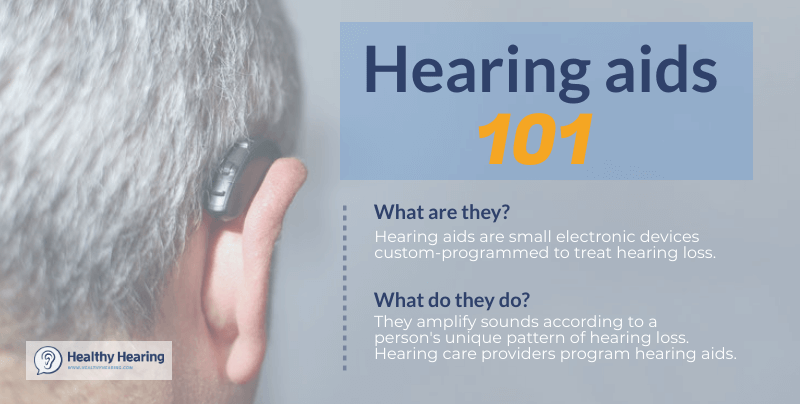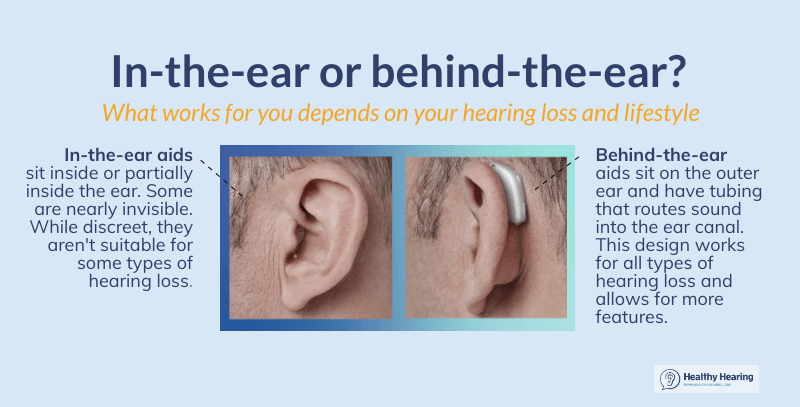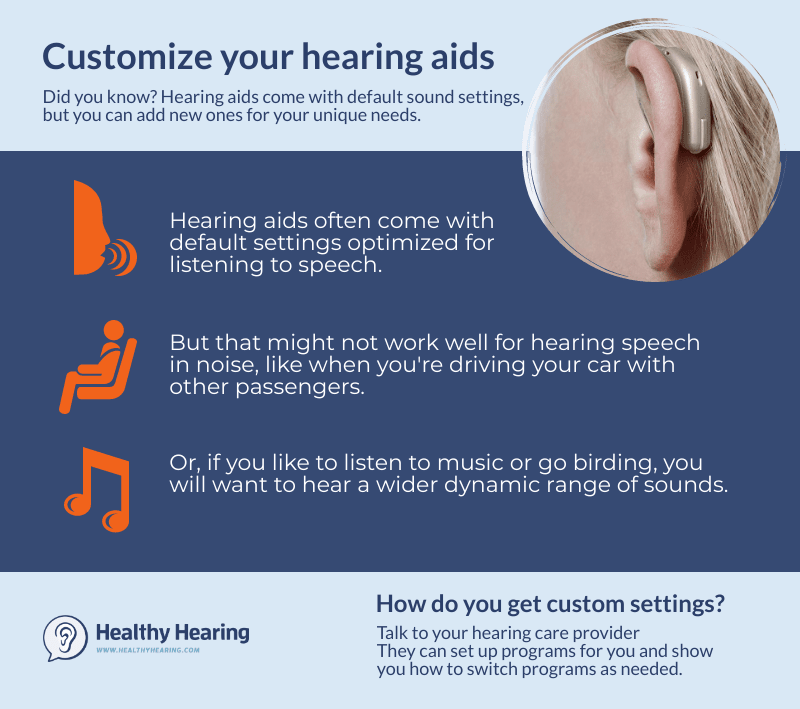|
www.HealthyHearing.com |
What are hearing aids?
By Joy Victory, managing editor, Healthy Hearing  Reviewed by
Amy Sarow, AuD, clinical audiologist Reviewed by
Amy Sarow, AuD, clinical audiologist Last updated on: March 31st, 2025 Hearing aids are used to help people with hearing loss. Find out if they're a good option for you. Key points:
About 15% of American adults report at least some trouble hearing, according to survey data from the National Institute on Deafness and Other Communication Disorders (NIDCD). For these millions of Americans living with hearing loss, hearing aids are they most commonly recommended treatment. What are hearing aids?Hearing aids are small electronic medical devices worn on or in the ears. They amplify sound in a person's environment to help them hear better. Hearing aids are typically programmed and monitored by a hearing care provider who has training and expertise in hearing loss and hearing aids. A hearing are provider can help you determine if hearing aids are a good fit for you. Hearing aids are usually recommended for people who have a type of hearing loss known as "sensorineural," meaning that some of the tiny hair cells of the inner ear are damaged. The surviving healthy hair cells pick up the sound delivered by the hearing aid and send them as neural signals to the brain via the auditory nerve.
The parts of a hearing aidAll hearing aids contain microphones to detect sound in a person's environment. A tiny computer processor inside the device then analyzes the sounds and amplifies them according to a person's unique pattern of hearing loss. These sounds are delivered to the ear via a speaker that sits in the ear canal. More: Understanding the parts of a hearing aid What types of hearing aids are there?Hearing aids can be classified into two main groups: in-the-ear (ITE) styles and behind-the-ear (BTE) styles.
Hearing aids come in a variety of styles and sizes, each designed to suit different preferences and lifestyles. Smaller styles, like completely-in-the-canal (CIC) devices, offer subtlety, while larger models may provide more power and additional features. Your hearing care professional will be a vital asset in helping you pick the best style for you. In the meantime, our comprehensive guide to hearing aid types and styles can give you a more detailed picture of what options might work best for you. Standard hearing aids vs. power hearing aidsFor people with mild-to-moderate hearing loss, standard hearing aids work best. "Power" models are often used for people who have severe-to-profound hearing loss as the technology can provide more power to treat a severe hearing loss. Do I need hearing aids?Hearing aids are typically recommended if your hearing test results show hearing loss on an audiogram. However, because signs of hearing loss can often be subtle it first, it can be hard to know when to get your hearing checked. Some early symptoms can include:
Anyone who suspects they have hearing loss should find a local hearing provider and schedule a test to determine both the cause and severity of any hearing issues that might be present and find the right treatment options. Where do I get hearing aids?Prescription hearing aids are medical devices available at hearing and audiology clinics across the U.S., as well as online. Our extensive directory of consumer-reviewed hearing centers can help you find a local clinic. What about over-the-counter hearing aids?In 2022 the FDA approved OTC hearing aids for adults 18 and older with mild to moderate hearing loss. You can purchase them at big box stores, online retailers or buy them directly from consumers. However, it's important to be aware that OTC devices are not intended for children or people with more severe types of hearing loss. More: All about: Over-the-counter hearing aids How much do hearing aids cost?Hearing prices can vary depending largely on the sophistication of the technology. According to a reader survey done by Hearing Tracker, the average cost of hearing aids in 2025 is $4,672, however it can range from $1,000-$8,000. More: Hearing aid prices Will insurance cover my hearing aids?It depends. Most adults pay out-of-pocket for hearing aids, as they're usually not covered by insurance, though it's worth checking with your provider for possible discounts. For children, insurance is more likely to help—check with your provider for coverage options. You may also consider financing through your hearing care professional, using CareCredit, or seeking assistance from charitable organizations or family. Programs like AARP's hearing care program and VA benefits may also help with costs. Medicare typically doesn't cover hearing aids, but it may cover some hearing tests. Medicare Advantage plans might offer partial coverage or discounted rates through third parties. More: Insurance and financial assistance for hearing aids Hearing aid technologyHearing aid technology has made leaps and bounds with modern devices being able to do so much more than their older counterparts. Popular hearing technology includes:
More and more hearing aids are also using AI technology which have the ability to, among other things:
Many manufacturers now also make accompanying hearing aid apps that give users added control over their devices. |
|
www.HealthyHearing.com |
What are hearing aids?
By Joy Victory, managing editor, Healthy Hearing  Reviewed by
Amy Sarow, AuD, clinical audiologist Reviewed by
Amy Sarow, AuD, clinical audiologist Last updated on: March 31st, 2025 Hearing aids are used to help people with hearing loss. Find out if they're a good option for you. |






 Joy Victory has extensive experience editing consumer health information. Her training in particular has focused on how to best communicate evidence-based medical guidelines and clinical trial results to the public. She strives to make health content accurate, accessible and engaging to the public.
Joy Victory has extensive experience editing consumer health information. Her training in particular has focused on how to best communicate evidence-based medical guidelines and clinical trial results to the public. She strives to make health content accurate, accessible and engaging to the public.